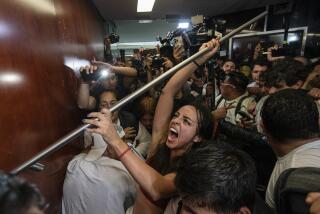New Voting Law Gives Edge to Sandinistas
- Share via
MANAGUA, Nicaragua — A law governing future Nicaraguan elections has passed the National Assembly, containing voting rights for Contra leaders and some safeguards against fraud but with a built-in edge for the ruling Sandinistas on the campaign trail.
While criticizing the new legislation as flawed, opposition leaders said Thursday they expect it to be improved with amendments as part of negotiations to end the six-year-old war here. National elections are set for November, 1990, and municipal elections are promised sometime before then.
The Sandinista National Liberation Front seized power in 1979 and held its first elections in 1984, winning the presidency and control of the assembly with two-thirds of the votes. But its claim to legitimacy was marred when the strongest rival coalition withdrew from the race, claiming the Sandinistas held undue advantages.
In peace talks this year, the Sandinistas offered to let Contra leaders negotiate new rules for future elections as part of a settlement of the war. After the peace talks collapsed in June, President Daniel Ortega sent his own election bill to the assembly.
During a 10-day debate, 11 leading opposition lawmakers accused the government of intransigence and walked out. But after the law was passed Wednesday night, they credited Conservatives who had remained with achieving major changes in the bill.
“This is not a totalitarian law,” said Luis Humberto Guzman, a legislator who boycotted the debate. “It does not offer us enough security, but it is a step toward opening up the system for a real challenge to the Sandinistas.”
Among the Sandinista concessions was one requiring ballots to be tallied twice--first at polling places and then at regional election headquarters, both times in the presence of observers from every party in the race.
The government also agreed to drop a requirement that public employees register to vote--a measure thought to favor the party in power--and to bar members of the armed forces from seeking office. And it gave the opposition a majority on a council that can give or take away a party’s legal status.
Old Statute Dropped
The law replaces a 1983 statute drafted by a Sandinista-appointed council of state. Dropped in the process was an article that had stripped voting rights from most Contras and from officers of the former dictatorship’s defeated National Guard.
The new law allows all 12 currently registered parties to take part in future elections. A new party may register by listing party officials in each municipality, a stiff requirement aimed at discouraging new splinter groups.
“This law is a powerful weapon for the Sandinista Front because it removes any excuse for opposition leaders to abstain (in elections) or for counterrevolutionaries to keep fighting,” Carlos Nunez, the Sandinista president of the assembly, told reporters. But he did not rule out amendments to the law if peace talks resume and produce an agreement on new rules.
Contra and opposition leaders disputed Nunez’s assertion that the law is fair. They said the Sandinistas can manipulate election outcomes through their majorities on electoral councils at national, regional and local levels. The opposition tried without success to win an equal voice on those councils.
Bosco Matamoros, a rebel spokesman in Washington, said the law was “made by and for the Sandinistas to legalize a dictatorship.”
Under one controversial provision, air time for political advertising during the 80-day campaign will be allotted to the parties in direct proportion to their shares of votes in the 1984 election.
Some politicians said the government could be hurt by an article of the law making it harder than before for splinter parties to win assembly seats. They said this could encourage a broad centrist coalition capable of threatening the Sandinistas.
More to Read
Sign up for Essential California
The most important California stories and recommendations in your inbox every morning.
You may occasionally receive promotional content from the Los Angeles Times.













